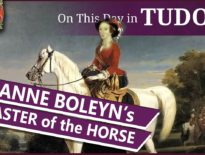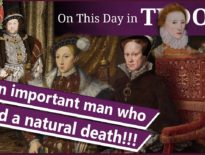On this day in Tudor history, 7th December 1549, rebel leader Robert Kett was hanged from the walls of Norwich Castle after being found guilty of treason. His brother William was hanged the same day, but from the steeple of Wymondham Church.
In 1549, Kett was seen as a rebel and traitor who endangered the city of Norwich, but today Norwich pays tribute to him as "a notable and courageous leader in the long struggle of the common people of England to escape from a servile life into the freedom of just conditions". Find out all about Robert Kett and Kett's Rebellion in today's talk.
The 7th December is also the traditional date given for the birth of Henry Stuart (Stewart), Duke of Albany and Lord Darnley, in 1545. He is known for being the second husband of Mary, Queen of Scots, and you can find out all about his rather colourful life, his unhappy marriage, his role in a murder, AND his own sticky end in last year’s video:
Also on this day in history:
- 1573 – Death of John Thorne, Master of the Choristers and Organist of York Minster, composer and poet, in York. He was buried in York Minster.
- 1613 – Death of Thomas Hesketh, botanist and physician, at Clitheroe Castle. John Gerard used Hesketh as a source for his “Herball” and was known for supplying gardens and nurseries with seeds and plants, including wild flowers.
- 1626 – Death of Sir John Davies, lawyer, politician, Attorney-General for Ireland and poet. Davies was found dead on the morning of the 8th December, the day that he was going to be installed as Chief Justice of the King's Bench. He was buried at St Martin-in-the-Fields, Westminster, and John Donne preached at his funeral service. Davies sat in the House of Commons in the reigns of Elizabeth I and James I, and was a favourite of Elizabeth I. His work included the 1599 “Hymns of Astraea”, which he addressed to the queen, and “Orchestra” (1595).
Transcript:
On this day in Tudor history, 7th December 1549, rebel leader Robert Kett was hanged from the walls of Norwich Castle after being found guilty of treason by a commission of oyer and terminer. His brother William was hanged the same day, but at Wymondham Abbey.
Let me tell you a bit more about Robert Kett and his rebellion…
• Robert Kett was born in the 1490s and was the fourth son of Norfolk butcher and landholder Thomas Kett and his wife, Margery.
• Kett was a wealthy man. He worked as a tanner in Wymondham and held lands in the area. His brother, William, was a butcher and mercer in the area, and both men were members of the local St Thomas Becket guild.
• Kett was married, his wife being called Alice, and the couple are thought to have had about 5 sons.
• The 1540s had seen a rise in the enclosure of common land by local landowners, meaning that villagers and small local farmers didn’t have as much land to graze their animals on, which, in turn, led to hardship and poverty. In July 1549, in the Wymondham area, the local people were unhappy with local landowner and lawyer John Flowerdew who had not only enclosed land but had also upset locals by being involved in the demolition of Wymondham Abbey following its dissolution. It appears that there had been some kind of feud between Flowerdew and Kett, and that Flowerdew paid those attacking his enclosures to move on and attack enclosures that Kett had done. However, Kett listened to the attackers’ grievances and was moved by their plight. He helped them to remove the fences and hedges, and became their leader and spokesperson.
• Kett and the rebels, who numbered between 16,000 and 20,000, then marched on Norwich, where they set up camp on Mousehold Heath. It was there under an oak tree, which came to be known as the “oak of reformation”, that Kett held court for those seeking justice from local landowners. From there, the rebels also drew up a list of grievances, which weren’t only about enclosure, but also included Protestant demands and complaints about priests. These grievances were sent to Edward Seymour, Duke of Somerset and Lord Protector, who was the leader of King Edward VI’s government. Somerset declared them rebels and offered them a pardon, which they refused.
• Following their refusal of a pardon, Kett and his rebels attacked Norwich on 22nd July 1549, successfully taking the city.
• Protector Somerset sent the Marquis of Northampton to put down the rebellion, but he ended up having to retreat. Then, Somerset sent John Dudley, Earl of Warwick, who, after being sent extra mercenaries on top of his force, was finally able to defeat the rebels at the Battle of Dussindale on 27th August 1549. The rebellion was over but Robert Kett had managed to flee. He was captured at nearby Swannington, the following day, and he and his brother were taken to the Tower of London and imprisoned.
• Robert and William Kett were tried for treason by a commission of oyer and terminer on 26th November 1549, found guilty and condemned to death. They were then taken back to Norfolk.
• On this day in history, 7th December 1549, Robert Kett was hanged from Norwich Castle’s walls and William Kett was hanged from the steeple of Wymondham Church.
• In 1550, the authorities of Norwich made 27th August, the anniversary of the Battle of Dussindale and the defeat of the rebels, a holiday in celebration of the deliverance of Norwich from the rebels. However, it stopped after a century and today a plaque on the castle wall reads:
“In 1549 AD Robert Kett yeoman farmer of Wymondham was executed by hanging in this Castle after the defeat of the Norfolk Rebellion of which he was leader. In 1949 AD – four hundred years later – this Memorial was placed here by the citizens of Norwich in reparation and honour to a notable and courageous leader in the long struggle of the common people of England to escape from a servile life into the freedom of just conditions.”
So by some he’s seen as a rebel and traitor, by others as a protector of the rights of the people.



How could he be considered as anything other than a fine leader who sacrificed much in order to resist the abuse of power by the landowners of Norfolk